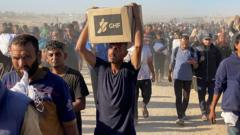Witnesses and international medical teams have reported horrifying scenes of violence as Israeli troops shot at Palestinians gathered at a newly established aid distribution center in southern Gaza early Tuesday morning. A foreign witness described the scene as "total carnage," while the Israeli military offered a starkly different account. They stated that "several suspects" approached their forces from unauthorized routes, leading to warning shots and subsequent fire aimed at those deemed threatening.
The tragedy of civilian deaths in the pursuit of food aid is likely to amplify criticism directed towards Israel's recently implemented distribution system for aid in Gaza. This new arrangement, endorsed by both Israel and the United States, seeks to replace the operation previously managed by United Nations agencies and experienced international relief organizations. It involves a private entity, the Gaza Humanitarian Foundation (GHF), which has faced significant scrutiny for its effectiveness and humanitarian principles.
Analysts have noted that the GHF was established following an Israeli blockade that left the Gazan population at risk of famine. Israel contends that UN personnel permitted Hamas to divert aid intended for civilians, while the UN refutes these claims, asserting accountability for their distributions and refusing collaboration with the GHF.
The recent upheaval highlights entrenched issues within the GHF system, which has already led to the resignation of its head, Jake Wood, citing its inability to adhere to humanitarian principles of neutrality and independence. Previously, the UN provided a comprehensive network of aid that included communal kitchens and bakery supplies, but the GHF's current operation forces people to traverse dangerous areas to receive limited rations, resulting in competition and disorder.
This turmoil has drawn sharp criticism from international parties. UN High Commissioner for Human Rights, Volker Türk, condemned the GHF model for showing "utter disregard for civilians," emphasizing the plight of individuals desperate for sustenance. Furthermore, he accused Israel's actions of neglecting international laws concerning civilian protection during conflicts.
Proponents of the GHF system argue it offers a basic, albeit imperfect, means of food provision, while detractors allege it is primarily a method for Israel to exert control over Palestinian populations. The Israeli government has openly acknowledged the strategic use of food aid as leverage against Hamas.
Amidst escalating concerns, Israel's Western allies, including the UK, France, and Canada, have begun pressing for substantial reforms in Israel's operational practices in Gaza. They are contemplating potential sanctions or formal recognition of a Palestinian state if there is a lack of significant change. Observers note with alarm the dire circumstances faced by the hungry in Gaza, as Israel's diplomatic relations deteriorate further within the international community.


















